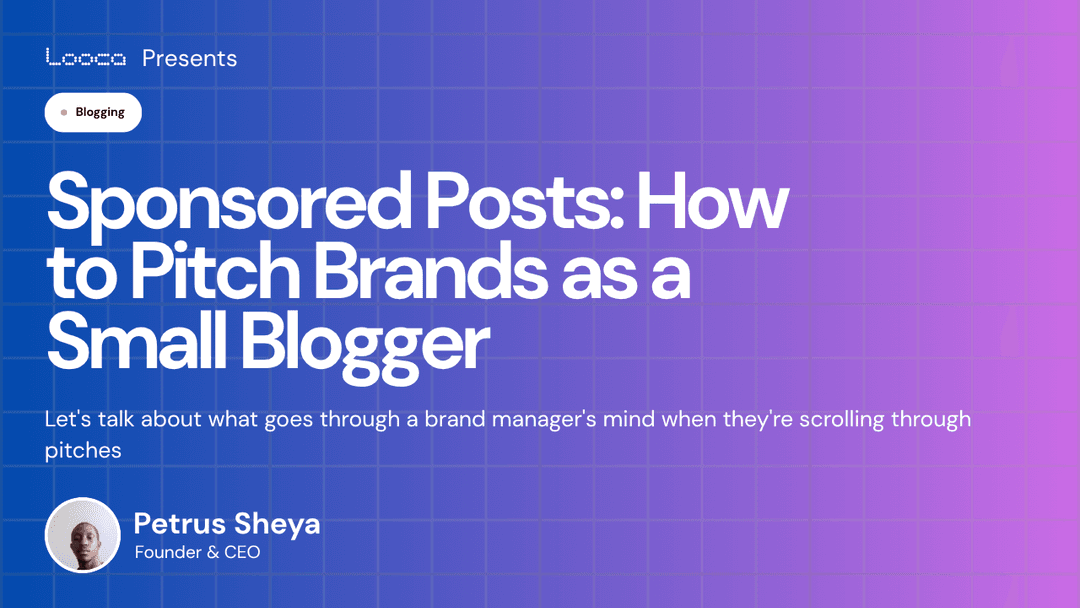Sponsored Posts: How to Pitch Brands as a Small Blogger

Petrus Sheya
October 11, 2025

So you've been thinking about reaching out to brands, but the idea of sending that first pitch feels... intimidating. Maybe you're wondering if you're even "big enough" yet. Maybe you're staring at a blank email screen wondering what on earth to say. If that's you, take a breath. You're ready. And this guide is going to walk you through exactly how to do it.
Here's the thing nobody tells you: you don't need millions of followers to land brand collaborations. You just need to know what you're doing. And honestly? Most small bloggers actually have a superpower that bigger creators don't have yet. You're about to find out what it is.
What Brands Are Actually Looking For
Before you hit send on anything, let's talk about what goes through a brand manager's mind when they're scrolling through pitches. They're not sitting there checking follower counts as much as you think. They're looking for three specific things.
First: Do you share similar values? Brands want partners who actually believe in what they're selling. When you genuinely love a brand, it shows. They're looking for people who align with their mission and values because that authenticity is what makes campaigns feel real to their customers.
Second: What's your community like? Here's where being small actually works in your favor. Brands measure engagement rate, not follower count. If you have 5,000 followers with a 10% engagement rate, you're incredibly valuable to them. That means your audience actually cares about what you have to say. People are commenting, sharing, clicking through. That's gold to a brand. In fact, if you have fewer than 10,000 followers, you're potentially at an advantage because smaller communities typically show higher engagement percentages.
Third: Can you create good content? This is the real deal. Take an honest look at your blog or social feed. Would you hire you to create content? If the answer is yes, you're ready. If it needs some polish, that's okay too. The important thing is that you're consistently creating content that you're proud of.
Two Goals, One Pitch
This might sound counterintuitive, but here's the secret: your pitch goal is not to land a paid collaboration. It's not to get free stuff. Your goal is to create a genuine connection.
When you approach pitching from that angle, everything changes. You're no longer desperate. You're no longer begging. You're someone interesting who has something valuable to offer.
Brands get hundreds of DMs and emails every single day from people asking for free things. They delete most of them without reading. But when someone sends a thoughtful, genuine message that shows they actually understand the brand? That stands out.
So your pitch should do two things: create a real connection with the person on the other side, and ask to start a conversation. That's it. A coffee chat. A call. An email exchange. You're not asking them to say yes to a deal. You're asking them to talk. Everything else flows from there.
The Pitch Structure That Works
Alright, let's build this thing. Here's the framework that actually converts.
Your Subject Line
Keep it simple and straightforward. Something like "Collaboration idea from [Your Name]" or "[Brand Name] + [Your Handle]" works perfectly. You're not trying to be clever here. You just want them to open it.
Your Opening (The First 2-3 Sentences)
Introduce yourself in a warm, genuine way. Tell them who you are, what you do, and who you do it for. Then tell them why you actually like them. This is where you make it personal.
For example: "Hi [Brand Name], I'm [Your Name], and I help [your audience] with [what you write about]. I've been following your brand for a while now because [something specific you genuinely appreciate about them]." Maybe you love their mission. Maybe you've been using their product for years. Maybe something about their values resonates with you. The key is making it specific and true.
The Connection Layer
Spend two or three sentences going deeper. Do some research. Check out their website, their about page, their recent launches. What nonprofits do they support? What's their story? Find something that genuinely connects with you and mention it. This shows you didn't just copy-paste the same pitch to 50 brands.
Your Stats (The Good Stuff)
Here's where you highlight your best assets. And this is important: don't just list followers. List the things you're actually proud of. Your engagement rate. Your email list size. Your monthly readers. Your expertise in a particular area. Your experience. Whatever makes you valuable.
If you have 8,000 followers but a 12% engagement rate, lead with that. If you've been a professional in your field for five years, mention it. You're showing them why they should care, not making them guess.
The Ask
Now you have two options here. You can pitch a specific idea if you have one. For example: "I noticed you just launched [new product], and I have an idea for how my audience could help spread the word. Would you be interested in discussing this?"
Or you can keep it open-ended: "I'd love to explore whether there's an opportunity for us to partner together. Do you have time for a quick call to chat about your goals for this year?"
Most of the time, you won't actually get that call. But the fact that you're open to it, that you're professional and flexible, makes you stand out from everyone else who's just asking for free stuff.
The Sign-Off
Keep it warm but professional. Something simple like "Looking forward to connecting" or "Hope to hear from you soon" works great.
The Reality Check: Handling the No
Here's something everyone needs to hear: you're not going to land every pitch. Some brands won't respond. Some will say no. Some will ghost you. And that's completely normal.
Think about it this way. If you sent out ten pitches and got one yes, that's a 10% conversion rate. That's actually really good in this space. But it means nine people said no or didn't respond. That can feel rough until you reframe it.
The no doesn't mean you're not good enough. It might just mean your audience doesn't match theirs. It might mean they already have a contract with another creator. It might mean they're not taking on new partnerships right now. The no is almost never about you as a person or a creator.
Some of the best brand deals will come from your second, third, or fourth pitch to the same company. Follow up. Stay persistent but respectful. Show the brand that you genuinely care about a partnership, not just about getting free stuff.
Where to Start if You're Nervous
If cold-emailing feels too scary right now, that's completely okay. There's another route. Consider using third-party influencer marketing platforms. These platforms help creators connect with brands that are actively looking for partnerships. You fill out your information, set your rates, describe your niche, and brands can find you.
These platforms take some of the anxiety out of reaching out to brands yourself. It's more of a mutual discovery process. You're both there looking for collaboration opportunities. It's less intimidating, and it can be a great way to build confidence and land your first few deals before you start cold-emailing brands you love.
You're More Ready Than You Think
The hardest part of this whole process is hitting send. Everything else is just following a formula. And the good news? You have a formula now. You know what to say. You know what brands are looking for. You know what to highlight about yourself.
So stop waiting for the "right time" when you have more followers or when your content is "perfect." None of that matters as much as you think it does. What matters is that you're creating content you're proud of and that you're willing to show brands how you can help them reach their goals.
Start with one pitch today. Just one. Pick a brand you genuinely love. Spend twenty minutes researching them. Craft your email. And send it. You might be surprised what happens.
The brands that say yes won't care about your follower count. They'll care about your community, your values, and your ability to create something real. And that's something you already have.
